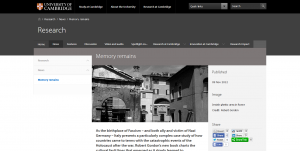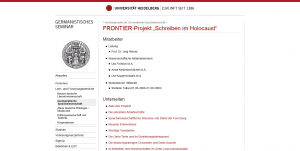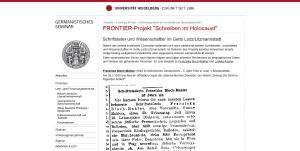Israel:
The Weiss-Livnat International MA Program in the Holocaust Studies-University of Haifa
This program is one of the best in the world because it gives the student the ability to study the Holocaust through study abroad trips to Poland and the sites of the Holocaust. They also study the Holocaust by being a mentor to a survivor, almost like a part of their healing process. It is a masters program that is open to the international community.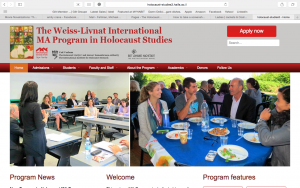
Holocaust Studies, Undergraduate Minor-Western Galilee College
This program is quite small, but a respected organization regarding the public outreach. It is a minor for their undergraduate program, and the program seems to be just for the students in Israel since it’s in mostly Hebrew. It appears that their professors have a lecture series in which they are on YouTube.
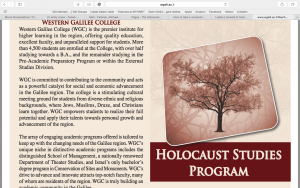
Eastern Europe
Czech Republic- Prague
Charles University has two websites devoted to Jewish studies. One which takes a more academic approach, the other taking a more touristic approach, although still an educational site. Charles focuses mostly on their own history of Jewish studies, intellectuals, and individuals; then talks about their current program, how excursions exist within the program to other relevant areas related to the Holocaust, etc.
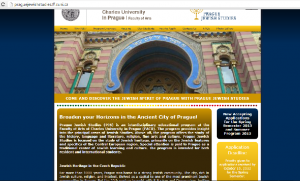
The above photo is of the more touristic based website. The reason being that this website is written in English only, despite that the university’s second site has a Czech option. There are many terms used throughout the site that indicate this. In fact, on the very first page, the leading line is “Broaden your Horizons in the Ancient City of Prague!” This, along with other phrases such as : “study at the oldest university in central Europe”, or “ Since you are studying in Prague for such a limited amount of time.” to name a few, are examples of this . Despite the fact that this is a site that sells itself to its’ viewers- most likely prospective students, international students, and their families, the site does do a good job of stirring up interest for the universities’ program.
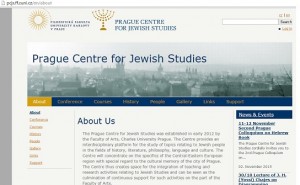
While the first site was more focused on tourism, the second site (pictured directly above) seemed to be more focused on the programs themselves. This website showcased the schools achievements, events, and talked about Prague’s history, and the reason for the programming in greater depth. Here it is possible to learn who sits on the academic board for the program, what educational activities, conferences and speakers the school has had recently, and even links to other sites similar in topic for the interested viewer.
This site can be viewed in both English (lingua franca) and Czech.
Poland-Kraków
Jagiellonian University
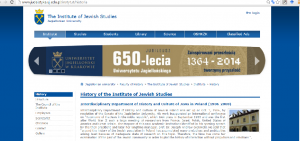
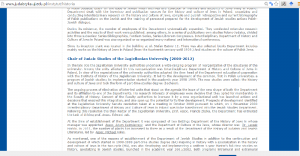
This university caters less to international students than Charles university did, mostly because the site is only featured in Polish. However, this is an easy fix because of modern translation applications and let’s be honest, Chromes ability to translate a page. This website has a lot more text than most other university web pages (an example of this being the second picture listed under “Jagiellonian University”) however, it is also very informative.
It turns out that this particular program was created in 1986, in the hopes of combating ignorance and prejudice of the Jewish community in Poland through unbiased study of Jewish history, culture and religion.
He said that “around the history of the Jewish population in Poland has accumulated many prejudices and ambiguities arising least because of inadequate state of research on this topic. Therefore, the time has come fair examination of the past of the Jewish community in order to plot the history of interaction without prejudices and emotions “. -Dr. Joseph Andrew Gierowski
The site displays the topics of study that students may engage in under the broader subject of Jewish study- for example there is a department of Jewish history, a department of Jewish culture, Jewish literature etc. It features the faculty in charge and their contact information, a list of events associated with the program that the school has taken part in, as well as a gallery which features student interest, excursion/ travel opportunities related to this program, and events that have taken place.
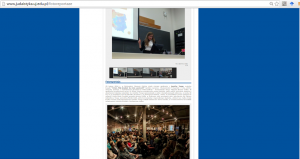
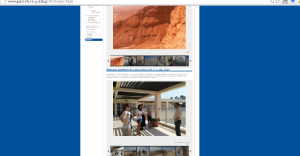
Overall, this website really seems to cater to those who are genuinely interested in this field of study, and can even teach a viewer of the site a thing or two while they are browsing.
Western Europe
Cambridge, UK
From Cambridge University, Tom Kirk writes about Robert Gordon’s interpretation of how Italy reacted to the events of The Holocaust. Kirk’s site is most likely for a more public audience, yet one that still has some academic inclinations. Perhaps students or other academics interested in further research into The Holocaust. Kirk cites not only Gordon but Primo Levi, using multiple first hand accounts to better explain the Italian’s delayed response. While this site is far too small to explain everything in Gordon’s book, I believe Kirk is interested in furthering research on the topic, as it is one that does not gain the spotlight frequently. The format is primarily in all text and refers to secondary sources, mostly Gordon and Levi.
Gordon said. “In the 1960s, an Italian schoolchild might have read Anne Frank or Primo Levi. From the 1990s, class trips to concentration camps became common. Many children never forget this first contact, and even if they don’t study it further, it comes to define their understanding of history, of their country and their identity.”
Kirk gives a general academic example of a site that could be used for an undergraduate student’s initial research into a topic or to guide the to further research. It’s a more detailed take on a specific event in the holocaust than many broad works on the web. It is a fairly good model for our group to base our own works off of to remain appealing to perhaps not the common reader, but common undergraduate student.
Heidelberg, Germany
Heidelberg University
The Frontier Project from Heidelberg University was created primarily by Jörg Riecke along with a team of students and other academics out of Heidelberg University. This is particularly interesting as it shows how Germans themselves can comment on the topic of The Holocaust. The topic covered is writing created during The Holocaust and exclusively focuses on researching the primary sources. This website is not intended for the public, but most likely more advanced history students who wish to view the research of Rieche and his student’s work. The information is entirely verifiable as it is based on primary sources accessible to others.
The format of the site is also less appealing to the public but rather in a more organized format intended for one to view from a research perspective. Multiple pages break down the research in order to focus less on summarization of the sources, but to simply display their information. This website would be an outlier from the general portrayal of The Holocaust as it does not have the appeal of more aesthetically appealing sites with vivid descriptions and interpretations.
An uninformed viewer would find this site difficult as it provides a single window into The Holocaust; entirely through writings. The audience is most likely other students at Heidelberg interested in keeping up with the research; most certainly not an international audience as the site is entirely in German. A student of The Holocaust would find this extremely helpful as it provides resources to further research as well as an academic example of how to present research. This also is a more detailed example of Holocaust research on the web and does not simply provide a general explanation.
http://www.gs.uni-heidelberg.de/forschung/frontierprojekt.html
